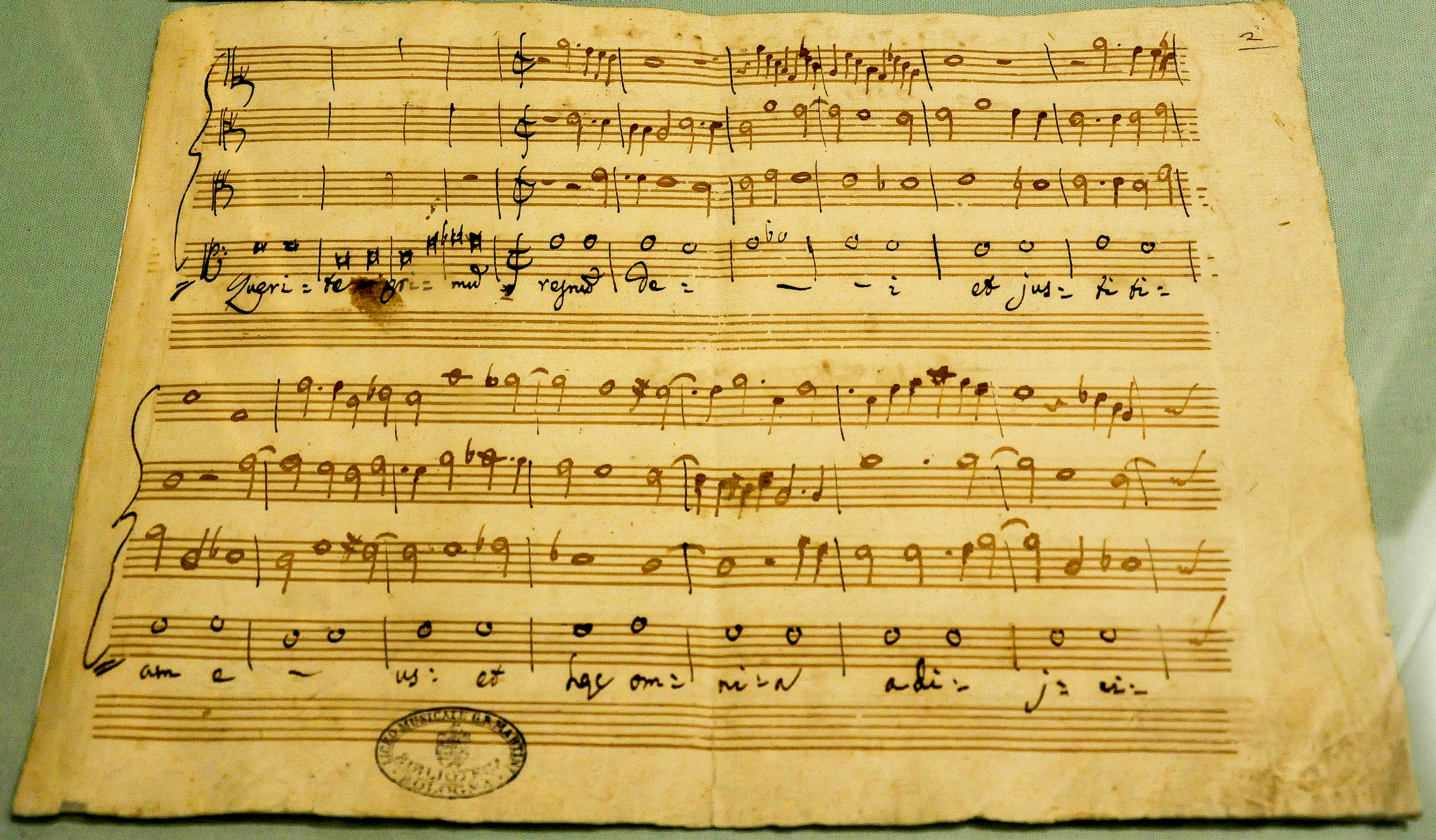Wolfgang Amadeus Mozart
 Wolfgang Amadeus Mozart
Wolfgang Amadeus Mozart (
Salzburg,
27 januari 1756 –
Wenen,
5 december 1791), doopnaam
Joannes Chrysostomus Wolfgangus Theophilus Mozart, was een uit het
prinsaartsbisdom Salzburg afkomstige
componist,
pianist,
violist en
dirigent. Hij excelleerde in elke courante muziekvorm uit zijn tijd, met name in opera, de symfonie, het pianoconcert en kamermuziek. De muziek die hij als volwassene componeerde, geworteld in Oostenrijkse en Zuid-Duitse tradities, maar gekleurd door de Italiaanse opera, kenmerkt zich door haar melodische schoonheid, formele perfectie en rijkdom van harmonie en textuur. Samen met
Johann Sebastian Bach en
Ludwig van Beethoven wordt hij beschouwd als componist die binnen een traditie nieuwe muzikale concepten bedacht en die diepgaande invloed uitoefende op alle na hem komende componisten. Mozarts werk wordt gerekend tot de muziek van de
klassieke periode. Met
Joseph Haydn en
Ludwig van Beethoven vormt hij, muziekhistorisch gezien, de
Eerste Weense School.
miniatuur|Zijn manuscript van ''Quaerite primum regnum Dei'' (1770)
Mozart was een
wonderkind, dat op uitzonderlijk jonge leeftijd
viool,
klavecimbel en
orgel speelde en kwalitatief hoogstaand werk componeerde. Hij was een veelzijdig componist. Hij schreef vocale muziek in de genres
opera,
Singspiel en
mis. Daarnaast componeerde hij instrumentale orkestmuziek, zoals
symfonieën,
serenades en
divertimenti en
soloconcerten, vooral voor
piano en orkest. Ook componeerde hij
solomuziek, zoals
pianosonates en
kamermuziek, waaronder sonates voor diverse instrumentale bezettingen en
strijkkwartetten en -
kwintetten.
Door Wikipedia aangeleverd
-
1
-
2
 Wolfgang Amadeus Mozart (Salzburg, 27 januari 1756 – Wenen, 5 december 1791), doopnaam Joannes Chrysostomus Wolfgangus Theophilus Mozart, was een uit het prinsaartsbisdom Salzburg afkomstige componist, pianist, violist en dirigent. Hij excelleerde in elke courante muziekvorm uit zijn tijd, met name in opera, de symfonie, het pianoconcert en kamermuziek. De muziek die hij als volwassene componeerde, geworteld in Oostenrijkse en Zuid-Duitse tradities, maar gekleurd door de Italiaanse opera, kenmerkt zich door haar melodische schoonheid, formele perfectie en rijkdom van harmonie en textuur. Samen met Johann Sebastian Bach en Ludwig van Beethoven wordt hij beschouwd als componist die binnen een traditie nieuwe muzikale concepten bedacht en die diepgaande invloed uitoefende op alle na hem komende componisten. Mozarts werk wordt gerekend tot de muziek van de klassieke periode. Met Joseph Haydn en Ludwig van Beethoven vormt hij, muziekhistorisch gezien, de Eerste Weense School.
miniatuur|Zijn manuscript van ''Quaerite primum regnum Dei'' (1770)
Mozart was een wonderkind, dat op uitzonderlijk jonge leeftijd viool, klavecimbel en orgel speelde en kwalitatief hoogstaand werk componeerde. Hij was een veelzijdig componist. Hij schreef vocale muziek in de genres opera, Singspiel en mis. Daarnaast componeerde hij instrumentale orkestmuziek, zoals symfonieën, serenades en divertimenti en soloconcerten, vooral voor piano en orkest. Ook componeerde hij solomuziek, zoals pianosonates en kamermuziek, waaronder sonates voor diverse instrumentale bezettingen en strijkkwartetten en -kwintetten.
Door Wikipedia aangeleverd
Wolfgang Amadeus Mozart (Salzburg, 27 januari 1756 – Wenen, 5 december 1791), doopnaam Joannes Chrysostomus Wolfgangus Theophilus Mozart, was een uit het prinsaartsbisdom Salzburg afkomstige componist, pianist, violist en dirigent. Hij excelleerde in elke courante muziekvorm uit zijn tijd, met name in opera, de symfonie, het pianoconcert en kamermuziek. De muziek die hij als volwassene componeerde, geworteld in Oostenrijkse en Zuid-Duitse tradities, maar gekleurd door de Italiaanse opera, kenmerkt zich door haar melodische schoonheid, formele perfectie en rijkdom van harmonie en textuur. Samen met Johann Sebastian Bach en Ludwig van Beethoven wordt hij beschouwd als componist die binnen een traditie nieuwe muzikale concepten bedacht en die diepgaande invloed uitoefende op alle na hem komende componisten. Mozarts werk wordt gerekend tot de muziek van de klassieke periode. Met Joseph Haydn en Ludwig van Beethoven vormt hij, muziekhistorisch gezien, de Eerste Weense School.
miniatuur|Zijn manuscript van ''Quaerite primum regnum Dei'' (1770)
Mozart was een wonderkind, dat op uitzonderlijk jonge leeftijd viool, klavecimbel en orgel speelde en kwalitatief hoogstaand werk componeerde. Hij was een veelzijdig componist. Hij schreef vocale muziek in de genres opera, Singspiel en mis. Daarnaast componeerde hij instrumentale orkestmuziek, zoals symfonieën, serenades en divertimenti en soloconcerten, vooral voor piano en orkest. Ook componeerde hij solomuziek, zoals pianosonates en kamermuziek, waaronder sonates voor diverse instrumentale bezettingen en strijkkwartetten en -kwintetten.
Door Wikipedia aangeleverd